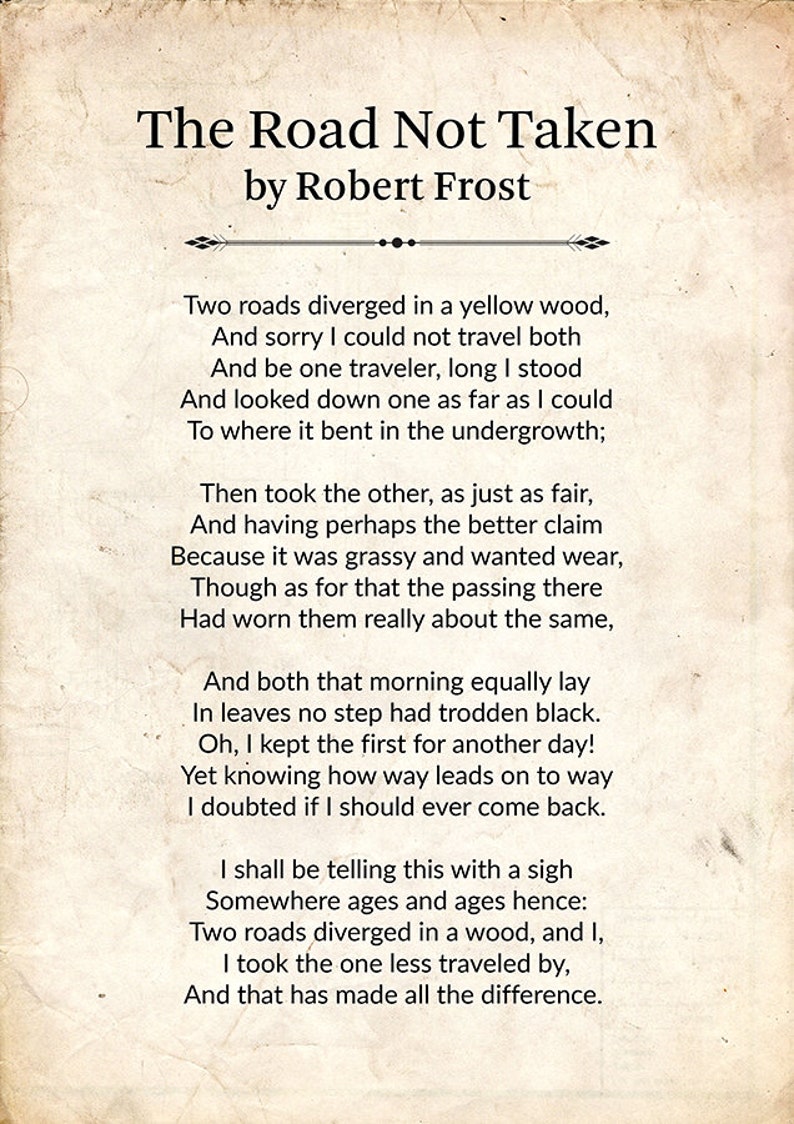


(There is no evidence that Frost ever contemplated doing so, in agony or otherwise.) Lyrics that are especially lucid and accessible are sometimes described as “critic-proof” “The Road Not Taken”-at least in its first few decades-came close to being reader-proof. Instead, he frequently told an idealized version of the story” in which, for instance, Thomas said, “What are you trying to do with me?” or “What are you doing with my character?” One can understand Frost’s unhappiness, considering that the poem was misunderstood by one of his own early biographers, Elizabeth Shepley Sergeant (“Thomas, all his life, lived on the deeply isolated, lonely and subjective ‘way less travelled by’ which Frost had chosen in youth”), and also by the eminent poet-critic Robert Graves, who came to the somewhat baffling conclusion that the poem had to do with Frost’s “agonized decision” not to enlist in the British army. As Thompson writes, Frost “could never bear to tell the truth about the failure of this lyric to perform as he intended it.
THE ROAD NOT TAKEN THEME SERIES
Yet even Thomas needed explicit instructions-indeed, six entire letters-in order to appreciate the series of double games played in “The Road Not Taken.” That misperception galled Frost. (6) Thomas responds on July 11, 1915: “You have got me again over the Path not taken & no mistake…I doubt if you can get anyone to see the fun of the thing without showing them and advising them what kind of laugh they are to turn on.”Įdward Thomas was one of the keenest literary thinkers of his time, and the poem was meant to capture aspects of his own personality and past. I don’t suppose I was ever sorry for anything I ever did except by assumption to see how it would feel.” I wonder if it was because you were trying too much out of regard for me that you failed to see that the sigh was a mock sigh, hypo-critical for the fun of the thing. (5) Frost writes back on June 26, 1915: “Methinkest thou strikest too hard in so small a matter.

It staggered me to think that perhaps I had always missed what made poetry poetry.” It’s still clear that Thomas doesn’t quite understand the poem’s stance or Frost’s “joke” at his expense. (4) Thomas responds in a letter dated June 13, 1915, explaining that “the simple words and unemphatic rhythms were not such as I was accustomed to expect great things, things I like, from. (3) Frost responds in a letter (the date is unclear) to ask Thomas for further comment on the poem, hoping to hear that Thomas understood that I was at least in part addressing his own behavior. (2) Thomas responds shortly thereafter in a letter now evidently lost but referred to in later correspondence, calling the poem “staggering” but missing Frost’s intention. (1) Frost sends the poem to Thomas, with no clarifying text, in March or April of 1915. The sequence of their correspondence on the poem is a miniature version of the confusion “The Road Not Taken” would provoke in millions of subsequent readers: Instead, Thomas sent Frost an admiring note in which it was evident that he had assumed the poem’s speaker was a version of Frost, and that the final line was meant to be read as generations of high school valedictorians have assumed. In the spring of 1915, Robert Frost sent an envelope to English critic Edward Thomas that contained only one item: a draft of “The Road Not Taken,” under the title “Two Roads.” According to Frost biographer Lawrance Thompson, Frost had been inspired to write the poem by Thomas’s habit of regretting whatever path the pair took during their long walks in the countryside-an impulse that Frost equated with the romantic predisposition for “crying over what might have been.” Frost, Thompson writes, believed that his friend “would take the poem as a gentle joke and would protest, ‘Stop teasing me.’” “ The Road Not Taken” has confused audiences literally from the beginning. Forward, you understand, and in the dark. Ever since infancy I have had the habit of leaving my blocks carts chairs and such like ordinaries where people would be pretty sure to fall forward over them in the dark. My poems-I should suppose everybody’s poems-are all set to trip the reader head foremost into the boundless.


 0 kommentar(er)
0 kommentar(er)
